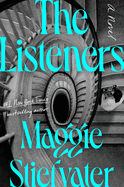
| Publisher: | Viking | |
| Genre: | Women, 20th Century - World War II & Holocaust, Fiction, Historical | |
| ISBN: | 9780593655504 | |
| Pub Date: | June 2025 | |
| Price: | $30 |
| Starred | Fiction |
by Maggie Stiefvater
War comes knocking at the doors of an Appalachian luxury hotel built on a mystical mountain spring in this assured, propulsive adult debut from powerhouse YA author Maggie Stiefvater (The Raven Cycle)
The morning of January 25, 1942, starts out like any other for June Hudson, mountaineer and general manager of the Avallon, a West Virginia luxury hotel. On the agenda is a ball--a demonstration that life at the hotel will remain unchanged despite the entrance of the U.S. into World War II. The Avallon attracts a privileged class with the money to buy themselves time surrounded by beauty, five-star service, and the allegedly curative "sweetwater" from the springs that feed the hotel's taps and bathhouses. Then the Feds arrive.
Special Agent Tucker Minnick of the FBI informs June that her guests must leave to make way for 300 foreign nationals--high-profile citizens of Axis nations living in the U.S. The group includes diplomats and celebrities, and their family members, all in need of protection and possibly containment. Tucker’s task is tough enough, but he didn't count on finding the Avallon's manager so compelling. June has her hands full convincing her staff to wait on Axis dignitaries, but her attraction to Tucker and her concern for the young daughter of a Nazi official will change everything she thought she knew about her future at the Avallon.
Stiefvater's unerringly distinct voice gives an almost supernatural glamor to the beauty of the West Virginia wilderness. A touch of magical realism ought to satisfy fans of Stiefvater's fantasy novels, and this mature, layered drama should appeal to historical fiction readers as well. --Jaclyn Fulwood, blogger at Infinite Reads
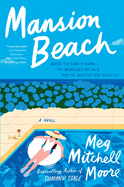
| Publisher: | Morrow | |
| Genre: | Women, Psychological, Friendship, Family Life, General, Literary, Thrillers, Fiction | |
| ISBN: | 9780063336964 | |
| Pub Date: | May 2025 | |
| Price: | $30 |
| Starred | Fiction |
by Meg Mitchell Moore
Meg Mitchell Moore's absorbing ninth novel, Mansion Beach, exposes the darkness behind the glittering facade of a picture-postcard summer on Block Island, R.I. Through the intertwined lives of three women, Moore (The Islanders; Vacationland) delves into the strictures of class, the ache of star-crossed love, and the explosive power of secrets.
Former lawyer Nicola Carr is starting fresh with a summer internship at a marine institute. Nicola is annoyed and intrigued by loud, decadent parties at the mansion next door, and she soon meets the house's owner. Juliana George is a self-made entrepreneur with a murky past and a connection to Nicola's cousin David, who is also on the island for the summer with his wealthy wife, Taylor. Nicola is drawn into Juliana's lavish lifestyle and navigates conflicting loyalties and a messy love triangle. Meanwhile, Juliana hopes to rekindle her bond with David while keeping her background under wraps.
Moore turns a keen eye on the ultra-rich: those born to privilege, like Taylor, and those who clawed their way to wealth and status, like Juliana. She lays bare the emptiness of lives focused on money and power but also shows her characters' longing for love and purpose, even if they pursue those ideals in questionable ways. As the summer beats on toward a shocking conclusion, Moore's characters must decide what price they'll pay for secrecy, peace of mind, financial success, or love.
Inspired by the sparkle and scandal of The Great Gatsby, Mansion Beach is a smooth, escapist summer cocktail, as bracing and elegant as a gin martini--with a twist. --Katie Noah Gibson, blogger at Cakes, Tea and Dreams
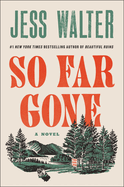
| Publisher: | Harper | |
| Genre: | Cultural Heritage, Literary, Fiction, Action & Adventure | |
| ISBN: | 9780062868145 | |
| Pub Date: | June 2025 | |
| Price: | $30 |
| Fiction |
by Jess Walter
The genius of Jess Walter's writing is both mercury and steel: never predictable, always reliable. Like all of Walter's work, So Far Gone combines strong pacing and quick wit as it looks squarely at its subject, a man fighting to save his family after years of self-imposed isolation. Rhys Kinnick is jolted out of his reclusive life on land outside Spokane, Wash., when a stranger deposits his grandchildren on his porch, although he fails at first to recognize them. Though it had been rocky for years, his relationship with his daughter, Bethany, broke at Thanksgiving in 2016, when Bethany's husband, Shane, pushed his conspiracy talk too far and Rhys punched him. But Rhys's decision to disappear is bigger and deeper than just a family rift. As he explains it, "At some point, you look around, and think, I don't belong here anymore. I don't want to have anything to do with any of this." But when Bethany disappears and armed members of Shane's church forcibly take his grandchildren, Rhys can no longer ignore the broken world from a safe distance.
Walter (Beautiful Ruins; The Angel of Rome) is known for his humor, and So Far Gone does have moments that may elicit a chuckle, but the tone overall is darker, covered with an all-too-familiar feeling of bitter helplessness. There are villainous actors here, men full of cruelties, but there are also complicated, broken men like Shane, who are innocence and guilt all in one. So Far Gone poses enduring questions like how to reconcile our hope for the world and our fear of the worst that may yet come. --Sara Beth West, freelance reviewer and librarian
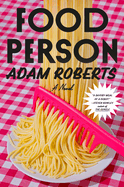
| Publisher: | Knopf | |
| Genre: | Romantic Comedy, Friendship, Humorous, City Life, Romance, General, Literary, Fiction | |
| ISBN: | 9780593803837 | |
| Pub Date: | May 2025 | |
| Price: | $28 |
| Fiction |
by Adam Roberts
In Food Person, the first novel by Adam Roberts, Isabella Pasternak is a ne'er-do-well food writer who dreams of writing a cookbook but instead gets fired from her position as the most forgettable writer at a trendy magazine. When she receives an offer to ghostwrite a cookbook for wayward, high-maintenance celebrity Molly Babcock, she's pretty sure the opportunity is not for her.
Food Person is a funny, breezy read. Its hapless protagonist is endearing in her total disinterest in her appearance, laser focus on food, and deeply relatable tendency to make very questionable choices. When Isabella is pressured into taking the ghostwriting gig, she and Molly immediately clash, kicking off a dramatic roller coaster that doesn't stop until the novel hits its satisfying conclusion.
Much of the humor comes from a pitch-perfect understanding of character, as evidenced by the dynamic between Isabella and her lovable but self-obsessed best friend and roommate, Owen. He's so caught up in his career track at his father's talent agency that he misses obvious things, like the fact that his home-latte-art hearts look like testicles. He and Isabella debate whether she should go away for a weekend with Molly (who also happens to be Owen's only client). " 'I want her to keep her head in the game,' he said, while finishing that day's scrotum."
There's much to love here, including food writing that will make readers hungry, family drama, and, of course, the all-consuming drive to find direction in life. Food Person is a delightful novel about an odd duck and her flailing attempt to figure it all out and get her life on track. --Carol Caley, writer
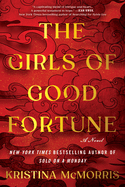
| Publisher: | Sourcebooks Landmark | |
| Genre: | Women, General, Fiction, Historical, Asian American & Pacific Islander | |
| ISBN: | 9781464252006 | |
| Pub Date: | May 2025 | |
| Price: | $17.99 |
| Fiction |
by Kristina McMorris
As she struggles to survive in Portland, Ore., a stoic young Chinese woman passing as white after the passage of the 1882 Chinese Exclusion Act endures life-threatening racism in The Girls of Good Fortune. In her propulsive eighth novel, Kristina McMorris (Sold on a Monday) tracks one family's fate and shines a light on the brutal treatment of immigrants recruited to build railroads to the western United States. McMorris's fiction is brimming with details of time and place; she captures the seedy aspects of western expansion and the vibrant stories of characters whose experiences molded the nation.
Celia Hart cautiously conceals her Chinese heritage by using her mother's maiden name instead of her father's surname, Chung. She lives alone after her mother died and her father left for a job in a Union Pacific Railroad coal mine, and she works as a housekeeper for the snooty Portland mayor's family. Her life takes a calamitous turn when white laborers massacre the Chinese miners and she and the mayor's son, to whom she's secretly engaged, conceive a child. Celia's courage supports her as she is dismissed from the mayor's mansion, becomes a housekeeper at the Dewdrop Inn brothel, shelters her beloved baby daughter, and survives her kidnapping from Portland's notorious Shanghai tunnels.
Surprisingly generous characters assist Celia, including the stern madam and kind ladies of the Dewdrop Inn, and a fellow "shanghaied" with Celia and forced into enslaved shipboard labor. Even when it seems unlikely that Celia will find "good fortune," readers will remain hopeful, as Celia does, for a satisfying ending. --Cheryl McKeon, Book House of Stuyvesant Plaza, Albany, N.Y.
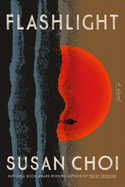
| Publisher: | Farrar, Straus and Giroux | |
| Genre: | Family Life, General, Literary, Coming of Age, Fiction | |
| ISBN: | 9780374616373 | |
| Pub Date: | June 2025 | |
| Price: | $30 |
| Fiction |
by Susan Choi
National Book Award-winner Susan Choi (Trust Exercise) presents another gripping novel with Flashlight. In the opening scene, 10-year-old Louisa and her father go for an evening walk on the beach with a flashlight to guide them, to gaze at the sea that separates Japan from Korea. That night, Louisa washes up on the beach barely conscious yet alive, but her father does not. When someone discovers her, Louisa reports that her "father was kidnapped."
The novel shifts among the perspectives of Louisa and her parents--Anne, a native Ohioan, and Serk Kang, a Japanese-born man of Korean descent--as well as Tobias, born of an affair Anne had before she met Serk, with a married man who insisted that he and his wife adopt Tobias. Choi's ability to make coincidences seem inevitable makes this a delicately balanced drama. Soon after the beach incident, other strange details surface. Choi feeds to readers seemingly disparate clues that coalesce in a tale of espionage and global conflict, and the heartrending ways in which world struggles play out in individual lives.
Anne, Serk, and Louisa waver between acts of tenderness and cruelty. Choi has a gift for instilling empathy in readers as she shows her characters' flaws; she gives insight into the tools Anne, Serk, and Louisa developed in order to protect themselves, even as they push one another away and cling to their secrets. Yet there is hope for Louisa--who by the end of Flashlight has opened her mind and can perceive a world outside herself. --Jennifer M. Brown
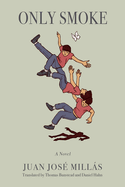
| Publisher: | Bellevue Literary Press | |
| Genre: | World Literature, Spain - 21st Century, Fairy Tales, Folk Tales, Legends & Mythology, Absurdist, Literary, Fiction | |
| ISBN: | 9781954276444 | |
| Pub Date: | May 2025 | |
| Price: | $17.99 |
| Fiction |
by Juan José Millás, trans. by Thomas Bunstead, Daniel Hahn
Only Smoke by Juan José Millás shimmers and drifts with an otherworldly ethereality. Millás is the winner of the Premio Nadal and many more of Spain's prestigious literary prizes, and this superb translation, by Thomas Bunstead and Daniel Hahn, is his third work to be published in North America.
Upon turning 18, Carlos learns that the father he's had no contact with since birth has recently died in a motorcycle crash. Carlos inherits his apartment and its contents. While settling in among his father's belongings, Carlos begins reading a collection of Grimms' fairy tales he finds there. He's soon literally immersed in the stories, becoming a ghostlike physical presence that accompanies the likes of Hansel and Gretel and Cinderella on their journeys. Moreover, he encounters in the tales the specter of his father, the last vestige of whom is seemingly trapped within the stories. Remnants of his father linger in the physical world, too: his diaries that Carlos finds, for instance, and a female neighbor, Amelia, who considered Carlos's father a good friend.
In his diaries, his father claims to have been the father of Amelia's child and to have inadvertently caused the child's death. Within the pages of the fairy-tale book and within the walls of his father's apartment, Carlos navigates the boundaries of layers of fiction, reality, and identity, searching for a way to fully inhabit the space he finds himself within.
Only Smoke is a captivating and thought-provoking modern fairy tale, a real joy for readers who love narratives that play with the craft of storytelling, penned by a contemporary master. --Elizabeth DeNoma, executive editor, DeNoma Literary Services, Seattle, Wash.
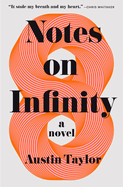
| Publisher: | Celadon Books | |
| Genre: | Women, Coming of Age, Literary, Fiction | |
| ISBN: | 9781250376107 | |
| Pub Date: | June 2025 | |
| Price: | $29.99 |
| Fiction |
by Austin Taylor
Austin Taylor's sharp, insightful debut novel, Notes on Infinity, charts the meteoric rise of a pair of Harvard students, Zoe and Jack, who first meet in an organic chemistry class, where they become intellectual sparring partners. When Jack helps Zoe secure a coveted position in a professor's lab, Zoe finds herself joining Jack in all-hours, all-consuming lab work. The two begin to suspect they've cracked the code to prevent aging, with promising results in their initial tests, so Jack convinces Zoe to drop out of Harvard, bring their idea to an investor, and join the breathless, cutthroat world of biotech startups. Jack and Zoe find themselves increasingly entwined on a personal and professional level, as they're caught up in the glamour and the pressure of their undertaking and its potential. But when the glittering facade of their work begins to crack, showing glimpses of the darkness underneath, neither of them is sure they can sustain what they've been striving toward, or how long their bond will survive.
Taylor, a Harvard graduate, turns a razor-keen eye on the dynamics of a world-famous, high-pressure environment filled with young, ambitious students convinced they are (or should be) the best. Taylor shows each phase of their turbulent partnership from both Zoe's and Jack's perspectives, reminding readers how many layers and variables always exist: in lab work, in competition, in love. Notes on Infinity is a blazing meditation on the pressure cooker of academia, the price of fame in the digital age, and how far is too far to go for a chance at corporeal--or scientific--immortality. --Katie Noah Gibson, blogger at Cakes, Tea and Dreams

| Publisher: | Atria | |
| Genre: | Women, Family Life, General, Suspense, Thrillers, Fiction | |
| ISBN: | 9781668066348 | |
| Pub Date: | June 2025 | |
| Price: | $28.99 |
| Fiction |
by Kit Conway
In Cat Fight, a suburban ecological paradise nestled in the English countryside becomes unmoored after a confrontation with nature during one hot, sultry summer. Alternating among the perspectives of three neighbors whose lives are not what they seem, Kit Conway's exceptional debut is an engrossing, gossip-laden domestic drama sizzling with secrets and deceit.
Small wild animals such as hedgehogs and badgers are common sightings in Sevenoaks, which borders a glorious wilderness reserve in Kent, but panthers are most definitely not. So when Adam King, the local heartthrob, sees one on the hood of his car, the ensuing panic reverberates far and wide. Neighbors are divided between those who believe Adam and those who don't, while for some residents the diversion proves to be very convenient indeed.
Emma Brooks hopes the panther hysteria will distract neighbors from her controversial home renovation plans, while Twig Dorsett considers the media attention on Sevenoaks a boon for her GoFundMe campaign--she'll do anything to raise money for her daughter's cancer treatment. Coralie King, a former zoologist, doesn't believe her weed-smoking husband actually saw a panther, but maybe by appeasing him she can save her marriage.
The launch of summer brings with it a "wildness unfurling" among neighbors. On its surface, Cat Fight is an entertaining parody of suburbia. As the mystery of the panther deepens and neighbors start behaving strangely, Cat Fight prowls its way toward a spectacular, terrifying conclusion. The panther itself is beside the point--it's the reaction it elicits from Conway's delightfully imperfect cast members that makes for memorable drama. --Shahina Piyarali
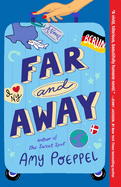
| Publisher: | Emily Bestler/Atria | |
| Genre: | Women, Family Life, General, Literary, Fiction | |
| ISBN: | 9781668022856 | |
| Pub Date: | June 2025 | |
| Price: | $18.99 |
| Fiction |
by Amy Poeppel
Amy Poeppel's warm, hilarious fifth novel, Far and Away, explores the vagaries of culture shock, the complexities of family, and the meaning of home through the lens of a Dallas-Berlin house swap.
Texan interior designer Lucy is solo parenting her three kids while her husband, Mason, is away on a not-so-secret NASA mission. Art collector Greta has just achieved the triumph of her career: a Vermeer to crown a collection focused on portraits of women. But when Lucy's math-geek son, Jack, makes a disastrous mistake, and Greta's husband, Otto, takes a job in Dallas, the two women connect online and agree to switch houses for the summer--with highly entertaining consequences.
Poeppel (The Sweet Spot) plunges her characters into one another's worlds. Lucy navigates Berlin with her rusty German and tries to keep her twin girls from destroying Greta's elegant Berlin flat. Meanwhile, Greta struggles to understand Texas--and Texans--while keeping an eye on her college-aged daughter in New York, and Otto delights in barbecue and Costco. As both women adjust to unfamiliar places, they're also forced to examine their snap judgments about each other and face difficult truths about the lives they've temporarily left behind. The summer brings a few unexpected twists that leave Lucy and Greta unexpectedly relying on each other for advice and connection, as their relationship morphs from chilly distance to grudging respect and then true warmth. Poeppel's narrative whisks readers back and forth across the Atlantic, providing a fast-paced adventure filled with humor, homesickness, and heart. Far and Away is a testament to the power of friendship--no matter where or how it appears. --Katie Noah Gibson, blogger at Cakes, Tea and Dreams
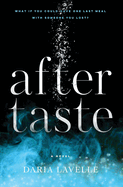
| Publisher: | Simon & Schuster | |
| Genre: | Humorous, Ghost, Fantasy, Literary, Fiction | |
| ISBN: | 9781668061596 | |
| Pub Date: | May 2025 | |
| Price: | $28.99 |
| Fiction |
by Daria Lavelle
Konstantin "Kostya" Duhovny channels his ability to discern favorite foods of the deceased into a mission to comfort those left behind, including himself, in Aftertaste, the debut novel by Daria Lavelle that blends love, loss, and culinary delights. Aftertaste is flavored with more than a dash of the fantastical as Kostya's story moves between the fast-paced Manhattan restaurant scene and the afterlife. Kostya's "clairgustance" (his ability to "taste from the other side") inspires him to open a restaurant where the house special is a dish individually created to entice a customer's loved one back for a last shared meal.
"Aftertastes appeared in Konstantin's mouth like messages." Mourning his father's sudden death and isolated from peers as a Ukrainian immigrant, lonely young Kostya doesn't speak of "the flavors uninvited, haunting the back of his throat." Drawn to the world of food, Kostya starts working in a bar where he gets an "aftertaste" of obscure ingredients and mixes a cocktail for a heartbroken young man--whose wife's phosphorescent ghost materializes. Kostya is now confident he can bring closure to the grieving.
Kostya is supported by characters as likable and fully realized as he is. Frankie is a loyal, affable "culinary juggernaut" who believes in Kostya's tasting and cooking skills. He narrates interstitial chapters as if he's an advertising director for his friend's efforts, seasoning the novel with humor. A romance with Maura, a feisty psychic, simmers despite her warnings not to awaken ghosts. Increasingly complex recipes and reunions climax in consequences even skeptical readers will find hopefully haunting. --Cheryl McKeon, Book House of Stuyvesant Plaza, Albany, N.Y.
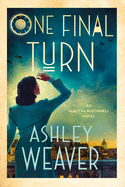
| Publisher: | Minotaur Books | |
| Genre: | Mystery & Detective, Fiction, Historical, Women Sleuths | |
| ISBN: | 9781250350930 | |
| Pub Date: | June 2025 | |
| Price: | $28 |
| Mystery & Thriller |
by Ashley Weaver
Safecracker-turned-spy Electra McDonnell heads to World War II-era Lisbon in the fifth and final installment of Ashley Weaver's smart historical mystery series One Final Turn.
After being dismissed (and rejected romantically) by her former handler, Major Ramsey, Ellie has returned to assisting her locksmith uncle in London. But then she's tapped for an intelligence assignment involving three escaped British POWs, one of whom might be her missing cousin, Toby. Traveling with the charming Captain Archie Blandings, Ellie must navigate an unfamiliar city and the difficulty of working with Major Ramsey again.
Weaver (Locked in Pursuit; A Peculiar Combination; A Deception at Thornecrest) plunges her characters into the murky realities of wartime life in a supposedly neutral country. Though Ellie is charmed by Lisbon's architecture and cuisine, she can't let the city's history or its enticing nightlife distract her from her mission. Every discovery related to the POWs and the valuable intelligence they carry puts Ellie, Ramsey, and Blandings in greater danger. Meanwhile, despite Ellie's attempts to treat the major professionally, she can't ignore the emotions his presence stirs up. Weaver tests her heroine's mettle with a series of increasingly complex challenges, compounded by Ellie's worry for her cousin and the strain of being far from home. A nail-biting confrontation at an ancient fortress throws a surprising new light on the case--and even more surprises wait for Ellie when she returns to London.
With charming characters and fascinating wartime details, One Final Turn is a crackerjack conclusion to an engaging series. --Katie Noah Gibson, blogger at Cakes, Tea and Dreams
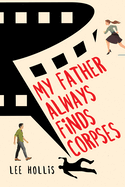
| Publisher: | Kensington Cozies | |
| Genre: | Mystery & Detective, Fiction, Women Sleuths | |
| ISBN: | 9781496738929 | |
| Pub Date: | May 2025 | |
| Price: | $27 |
| Mystery & Thriller |
by Lee Hollis
In the 1980s, Jarrod Jarvis was a child sitcom star; now he's playing detective in My Father Always Finds Corpses, credited to Lee Hollis (sibling writing team Rick Copp and Holly Simason). The novel is a spoofy comedy-mystery hybrid that makes fine use of three sitcom mainstays: the generation gap, droll misunderstandings, and the pulling of heartstrings.
The middle-aged Jarrod is living in Palm Springs and still grieving his 10-years-dead husband. Meanwhile, Jarrod's adult daughter, Liv, who shares the novel's point of view, is dating a filmmaker, Zel, who wants to make a documentary in which Liv reconnects with her surrogate mother. Although Liv is ambivalent, Zel forces a meeting between the two women. Zel's manipulation angers Liv, but before she can break up with him, she finds him in his studio with his head bashed in. Who better to investigate the murder than Liv, who has some criminal justice classes under her belt, and Jarrod, who has guest-starred on TV crime dramas (and, for that matter, has starred in three other Jarrod Jarvis mysteries, all by Copp)?
With its telegenic handful of suspects propelling a tidy mystery, My Father Always Finds Corpses favorably recalls a lighthearted TV detective show. The novel's humor often comes at Jarrod's expense, as when his cluelessness sabotages a potential new romance. Then there's his fixation on the past--not just the glory days of his acting career but the TV shows of that era, which he references with occasionally conversation-stopping regularity (Liv: "You're such a dork, Dad"). --Nell Beram, author and freelance writer
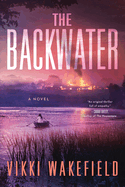
| Publisher: | Poisoned Pen Press | |
| Genre: | Women, Crime, Domestic, Thrillers, Fiction | |
| ISBN: | 9781464234880 | |
| Pub Date: | May 2025 | |
| Price: | $17.99 |
| Mystery & Thriller |
by Vikki Wakefield
In Vikki Wakefield's moody, character-driven thriller The Backwater, two women make life-changing decisions along the formidable banks of a river where ramshackle shacks and abandoned houses stand near mansions and homes of middle-class families.
Sabine Kelly was 17 years old when her mother, a drug dealer named Dee, and younger sister, Aria, died at their Far Peaks Trailer Park home in a fiery explosion that killed seven other people. Sabine was arrested as a suspect but escaped police custody and has been on the run for 12 years, living on a houseboat with her dog, Blue. When it seems safe, she secretly visits her grandfather, whose shack abuts the river.
Rachel Weidermann wants a fresh start after an unexpected divorce and the loss of her newspaper job. She hopes to get her journalism career back on track with a feature on Sabine, whom she recognizes visiting her grandfather. Despite many misgivings, Sabine consents--on one condition, that she has "control over [her] own story." She agrees to turn herself in after.
Sabine is guarded, but she is tired of feeling like her life has stalled. Wakefield compellingly sifts through Sabine's psyche, showing the toll of her situation and constant worries about the police, who often show up unannounced at her grandfather's house. She has a boyfriend, but their meetings are also fraught with the fear of being discovered. She "went from teenage girl to fugitive so fast her head is still spinning."
Rachel and Sabine realize that Sabine is still in danger from the ones who targeted her family years ago. Wakefield nimbly infuses tension in every scene of The Backwater. --Oline H. Cogdill, freelance reviewer
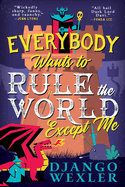
| Publisher: | Orbit | |
| Genre: | Fantasy, Fiction, Action & Adventure | |
| ISBN: | 9780316392402 | |
| Pub Date: | May 2025 | |
| Price: | $19.99 |
| Starred | Science Fiction & Fantasy |
by Django Wexler
The second novel in the Dark Lord duology by Django Wexler (Ashes of the Sun) brings the battle between humans and wilders to a thrilling end. The hilarity and obscenity from the first volume (How to Become the Dark Lord and Die Trying) continue in Everybody Wants to Rule the World Except Me, in which plot twists, double crosses, and near-death experiences abound.
Davi, the new Dark Lord, is tasked with leading a horde of wilders (nonhuman beings whom humans love to slaughter) to attack the Kingdom. In Davi's past thousand years of living, dying, and doing it all over again, she's always helped the Kingdom defend itself against the wilders and watched it fall every time. Now she's on the other side, but she still doesn't want to see the Kingdom destroyed. She's also discovered that she might not start all over again if she dies this time. The stakes for her own life are higher, and all the people she's led to their deaths in this iteration might actually stay dead. Accompanied by Tsav, her "sexy bald orc lady" girlfriend and captain of the horde, Davi heads to the Kingdom, where she discovers secrets about her situation beyond what she ever imagined.
As wild and unpredictable as the duology's first entry, this novel is also more desperate as Davi grapples with the idea of not getting another do-over. Wexler takes readers on a fantastic ride through thought experiments and intimate emotions in scenes that burst with action and excitement, culminating in a deeply satisfying conclusion. --Dainy Bernstein, freelance reviewer

| Publisher: | Berkley | |
| Genre: | Romantic Comedy, Romance, Fiction | |
| ISBN: | 9780593640845 | |
| Pub Date: | June 2025 | |
| Price: | $19 |
| Romance |
by Ali Brady
Ali Brady's piquantly tender fourth rom-com, Battle of the Bookstores, features two rival Boston-area booksellers forced into professional competition that's complicated by their highly inconvenient mutual attraction.
Buttoned-up Josie loves literary fiction, and she's proud to be managing Tabula Inscripta in Somerville's Davis Square, even if customers are scarce most days. Meanwhile, easygoing Ryan, who manages the romance bookstore Happy Endings, loves his chaotic store with its two cats and quirky staff. When the smarmy landlord who owns both bookstores decides to combine them--and hire only one manager--Ryan and Josie must compete for the job. As their literary tastes and management styles clash, neither realizes that they've already become friends by chatting on an online forum for booksellers.
Brady (Until Next Summer; The Beach Trap) mixes classic romance tropes (enemies to lovers, slow burn, forced proximity, only one bed) with deeper insights into both protagonists' backgrounds and their hang-ups regarding romantic relationships. Josie, who dropped out of college to care for her younger sister, who was struck by a car, is efficient and organized but terrified to show weakness. Ryan struggles to measure up to his three successful older brothers and open himself to love again after heartbreak. They're prepared to fight each other on behalf of their stores but soon realize that a little cooperation--during and after work hours--may sweeten the deal for them both.
Bursting with witty banter, charming secondary characters, and nods to a slew of great love stories, Battle of the Bookstores will have no problem winning readers' hearts. --Katie Noah Gibson, blogger at Cakes, Tea and Dreams
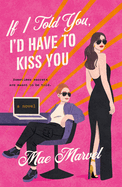
| Publisher: | St. Martin's Griffin | |
| Genre: | Romantic Comedy, LGBTQ+ - Lesbian, Romance, Contemporary, Fiction | |
| ISBN: | 9781250894700 | |
| Pub Date: | June 2025 | |
| Price: | $19 |
| Romance |
by Mae Marvel
If I Told You, I'd Have to Kiss You is a delightfully over-the-top sapphic romance by Mae Marvel, the pseudonym of authors Ruthie Knox and Annie Mare, who previously co-authored Everyone I Kissed Since You Got Famous. Yardley Whitmer III is sad that her relationship with her feisty girlfriend, KC Nolan, is crumbling. But since Yardley is also the Unicorn, one of the CIA's top field agents, she doesn't have time to dwell on the fact that she's moving out soon from KC's house.
But when an undercover mission goes awry and Yardley finally meets a tech called Tabasco in person, she discovers that Tabasco is none other than her soon-to-be-ex-girlfriend, KC. Now Yardley and KC are really in trouble, professionally and personally: they must recapture a digital superweapon from a bunch of scary bad guys, and face the fact that they've been lying to each other for three years.
Comparisons to Mr. & Mrs. Smith would be apt, but If I Told You, I'd Have to Kiss You goes a bit deeper. Yardley and KC come to understand that their relationship tanked because they wouldn't open up. They had both blamed their reticence on their tradecraft, but knowing each other's work secrets means that they must also acknowledge the vulnerabilities they've been concealing. Cleverly turning many tropes of the espionage genre on their heads, If I Told You, I'd Have to Kiss You is a rollicking good time and sure to appeal to fans of Casey McQuiston. --Jessica Howard, former bookseller, freelance book reviewer
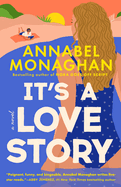
| Publisher: | Putnam | |
| Genre: | Women, Romantic Comedy, Romance, Fiction | |
| ISBN: | 9780593714102 | |
| Pub Date: | May 2025 | |
| Price: | $19 |
| Romance |
by Annabel Monaghan
Annabel Monaghan (Nora Goes Off Script; Summer Romance) mixes Hollywood glamour with beachy, extended-family hilarity in It's a Love Story. Former child star Jane Jackson, who spent her tween years as Janey Jakes, the klutzy, butt-of-the-joke star of a sitcom, is now trying to be taken seriously as a studio executive. Desperate to get a movie script greenlit, Jane tells her boss she can get megastar Jack Quinlan to write a song for the project.
Jane's co-workers don't know that although Jack and Jane have an old connection, they haven't talked in years, following an extremely awkward moment. However, Jane's work nemesis, cinematographer Dan Finnegan, hails from the small Long Island beach town where Jack is playing a festival, which might be Jane's opportunity to get in touch with Jack again. So Jane hops on a plane and ends up staying in Dan's childhood home because all the hotels are booked.
Funny, charming, and with just the right amount of introspection, It's a Love Story is a pitch-perfect beach read. Jane finally starts to come to terms with her childhood fame and realizes that Dan is actually pretty great, and his huge Irish family is delightful. Monaghan nails the big family vibes, and readers will root for Jane to become part of the Finnegan clan. Perfect for fans of Carley Fortune or Abby Jimenez, It's a Love Story is summer reading at its best. --Jessica Howard, former bookseller, freelance book reviewer
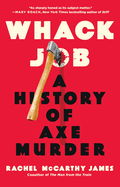
| Publisher: | St. Martin's Press | |
| Genre: | True Crime, House & Home, Weapons, General, Power Tools, Murder, History, Historical, Military | |
| ISBN: | 9781250276735 | |
| Pub Date: | May 2025 | |
| Price: | $28 |
| Starred | Social Science |
by Rachel McCarthy James
For millennia, the axe has served as a vital survival tool but also a weapon exemplifying the bloody nexus of technology and human violence, according to Rachel McCarthy James's bewitching Whack Job. "Every murder weapon has an innate interest," James says, and she claims none more so than the ubiquitous axe, the star attraction in this eclectic mix of 12 true stories of murder by hatchet. From the neolithic to the present, each story highlights a particular axe and how it exemplified the blade's evolution as a "piece of technology, weapon, and cultural symbol." James neatly pairs each axe (Egyptian battleaxe, Chinese yue, Tudor executioner's axe, the tomahawk, to name just a few) with a titillating tale of its use in the sanguine business of killing, whether by homicide or state violence.
With witty, pop culture-infused prose, James dissects the impact (pun intended) of the axe in the hands of such intriguing historical figures as Freydis (Viking daughter of Erik the Red), the Iroquois half king Tanacharison, Civil War ship cook William Tillman, and the quintessence of the phrase "axe murderer," Lizzie Borden. Each chapter is a breezy, illuminating read that contains moments of mirth readers will enjoy, thanks to James's cheeky penchant for the outré as the "earthbound flintiness" of the axe moves from practical to pure evil in the grip of those wielding it. Whack Job is a wildly entertaining keyhole history of the iconic implement and its tawdrier misapplications to murder. --Peggy Kurkowski, book reviewer and copywriter in Denver
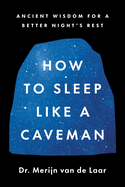
| Publisher: | Mariner Books | |
| Genre: | Life Sciences, Sleep, Exercise, Health & Fitness, Science, Evolution, General, Healthy Living | |
| ISBN: | 9780063430174 | |
| Pub Date: | May 2025 | |
| Price: | $28 |
| Health & Medicine |
by Merijn van de Laar
Sleep scientist and psychologist Merijn van de Laar's How to Sleep Like a Caveman: Ancient Wisdom for a Better Night's Rest provides an entertaining exploration of the contradictory claims of contemporary sleep researchers, commercial interests, and generally accepted wisdom to arrive at a balanced and reasoned conclusion about what constitutes the "right" kind of sleep for different groups of people at different times in their lives.
First, van de Laar teases out the distinctions between concepts such as "sleep pressure," "fatigue," and "sleep inertia" and debunks the "absurd standards of sleep duration" that exacerbate negative perceptions that individuals have about their own sleep. He reassuringly notes that in 2015, "the US National Sleep Foundation downgraded the required sleep duration for adults, concluding that 6 hours of sleep can also be sufficient."
As to the "caveman" referenced in the title, van de Laar explains that prehistoric populations--and indeed contemporary people who live in societies reminiscent of preindustrial cultures--didn't perceive fragmented sleep or longer periods of waiting to fall asleep as negative.
Van de Laar also compellingly discusses disorders such as sleep apnea and presumed connections between shorter sleep cycles and obesity, diabetes, and cancer. He delves into the variables of light, temperature, sleep hygiene, and environment, including sleeping surfaces and companions.
How to Sleep Like a Caveman is a delightful read for anyone interested in the ins and outs of how human beings spend (or try to spend) a third of their lives, and how to improve the experience. --Elizabeth DeNoma, executive editor, DeNoma Literary Services, Seattle, Wash.
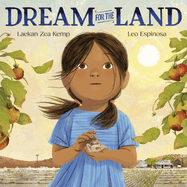
| Publisher: | Anne Schwartz Books | |
| Genre: | Hispanic & Latino, Environment, Science & Nature, Lifestyles, Farm Life & Ranch Life, Juvenile Fiction | |
| ISBN: | 9780593710302 | |
| Pub Date: | May 2025 | |
| Price: | $18.99 |
| Starred | Children's & Young Adult |
by Laekan Zea Kemp, illust. by Leo Espinosa
Dream for the Land is a moving and ultimately hopeful look at how one family in the Southwestern U.S. works and dreams of rain during a megadrought.
A child with brown skin and messy pigtails chases bunnies away from crops on her family's small farm. But this is the second batch of tomatoes that looks "withered on the vine" and the squash is being destroyed by spider mites. When a horned toad "skitters across the soil," Pá demonstrates how to catch it, kiss its head, and make a wish. The hardworking family prunes and weeds, but the drought means clouds refuse to "burst open over [their] small farm." When Pá was a boy, this same land "used to be green as jewels" and he would swim in the "cobalt river"; now, the river is only a memory. The child realizes the family needs some magic: they find another horned toad and "plant a gentle kiss on his head," dreaming of "the world as it once was" and "the world as it could be."
Laekan Zea Kemp (Somewhere Between Bitter and Sweet) tells a tenderhearted story that depicts the hardships of tending a drought-stricken land yet maintains hope. Illustrator Leo Espinosa (Islandborn) uses pencil and Photoshop to illustrate both sweeping landscapes and intimate emotion; an earth-toned palette uses gentle colors that realistically show the stark climate. Though the child's situation is dire, the story ends optimistically. A powerful author's note points out that although the Southwest is experiencing its longest megadrought in 1,000 years, there are "Indigenous communities and other communities of color that know exactly what the earth needs to heal." --Lynn Becker, reviewer, blogger, and children's book author

| Publisher: | HarperCollins | |
| Genre: | Friendship, Romantic Comedy, Romance, Contemporary, Social Themes, Young Adult Fiction | |
| ISBN: | 9780063045927 | |
| Pub Date: | June 2025 | |
| Price: | $19.99 |
| Children's & Young Adult |
by Becky Albertalli
A bisexual teenager develops feelings for her best friend while on a short road trip to meet her celebrity crush in Becky Albertalli's breezy-yet-compassionate contemporary YA novel Amelia, if Only.
Blonde high school senior Amelia Applebaum has been obsessed with YouTuber and fellow New York State resident Walter Holland's videos for "almost four years." Her friends dismiss Amelia's crush as a "no-risk parasocial infatuation," but Amelia feels a strong emotional connection to Walter, who, like her, is bisexual and Jewish. It feels like fate when Walter announces a meet-and-greet in a nearby town. Amelia gathers her "three best friends since literal kindergarten"--brown-skinned Zora, whose girlfriend, Edith, and "cool aunt," Jojo, live near the event, and Asian American twins Natalie and Mark--for "a super-sized holiday weekend" road trip to visit Zora's family and meet Walter. As the trip progresses, Amelia gradually realizes that she is attracted to sarcastic, guitar-playing Natalie, whose "smile makes my stomach ache." She must decide whether to pursue a relationship with Walter or confront her feelings for Natalie.
Albertalli (Imogen, Obviously; Kate in Waiting) brings her trademark humor and layered characterization to this story of identity, fandom, and first love. Chapters from Amelia's perspective are interspersed with social media posts, video transcripts, and Wikipedia entries about Walter that portray online discourse surrounding queerbaiting and boundaries between fans and creators. Amelia's sense that she knows Walter, although she has never met him, will be relatable for many who have grown up in the age of Internet celebrities. While the protagonist's dilemmas resolve a bit abruptly, Amelia, if Only is an endearing narrative of self-discovery. --Alanna Felton, freelance reviewer
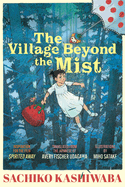
| Publisher: | Yonder | |
| Genre: | Friendship, Magic, Fantasy, Country & Cultural, Legends, Myths, Fables, Social Themes, Asian, Juvenile Fiction, Action & Adventure, Fairy Tales & Folklore | |
| ISBN: | 9781632063922 | |
| Pub Date: | May 2025 | |
| Price: | $18 |
| Children's & Young Adult |
by Sachiko Kashiwaba, trans. by Avery Fischer Udagawa, illust. by Miho Satake
A half-century since its original 1975 Japanese publication, Sachiko Kashiwaba's delightfully whimsical The Village Beyond the Mist arrives in the U.S. Translator Avery Fischer Udagawa and Japanese artist Miho Satake, both of whom worked on Kashiwaba's 2022 Mildred L. Batchelder Award-winning Temple Alley Summer, again display their talents through charming text and enchantingly inviting black-and-white line drawings.
Young Lina insists to the concerned policeman at the train station that she is "not running away. Or lost." She's rather proud she's made her first solo trip from Shizuoka, having changed trains at Tokyo and Sendai, "before disembarking exactly where her father instructed." She "only needs directions" to get to Misty Valley, where she's supposed to spend summer break. When Lina finally arrives at Picotto Hall--partially by tractor, partially led by her red and white umbrella flying ahead--elderly Ms. Pippity Picotto isn't exactly hospitable, surprisingly deeming her "an utterly unremarkable child!" Despite a tear-filled start, Lina finds nurturing kindness from plenty of others as she's tasked with various jobs: shelving books at Nata's bookstore, cleaning up Thomas's shop, dusting Shikka's ceramics store, scolding and saving a spoiled prince, and helping at Monday's toy shop. As acerbic as she seems to be, Ms. Picotto eventually reveals why Lina's father sent her to this faraway forest village.
If Kashiwaba's fantastical adventure sounds somewhat familiar, that's because it was the source material for Hayao Miyazaki's albeit darker animated classic film, Spirited Away. With seamless lessons on acceptance, sharing, and compassion, Kashiwaba's hidden village is undoubtedly lighter and gentler, ready to welcome new audiences for return visits. --Terry Hong
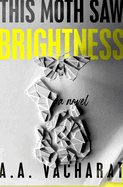
| Publisher: | Dutton Books for Young Readers | |
| Genre: | Biracial & Multiracial, Mental Illness, Social Themes, Young Adult Fiction, Neurodiversity | |
| ISBN: | 9780593698600 | |
| Pub Date: | May 2025 | |
| Price: | $20.99 |
| Children's & Young Adult |
by A.A. Vacharat
A compassionate representation of autism and mental illness is accompanied by smart, eye-opening commentary on government experiments, conspiracy theories, and even the death of the "American mall" ("the death of humanity" itself) in A.A. Vacharat's debut, This Moth Saw Brightness.
Seventeen-year-old 'Wayne Le has been randomly selected to participate in a "consensual health and nutrition study" at Johns Hopkins University. He must complete daily tasks via an app, wear a wrist monitor, attend a few in-person appointments, and take a pill every few weeks. Then he'll receive a stipend of $200 and a commendation letter proving to his father that he's "a worthwhile human being"--something he hasn't felt like since his mother "ran away... literally screaming." The study soon proves to be more than just medical research, and 'Wayne, his best friend Keshav "Kermit" Shah, and his crush Jane, who is autistic and a fellow study participant, find themselves at the center of a secret government project--or maybe not.
Vacharat's debut YA novel is a compelling dissection of humanity's "impulse to treat... people like they are the property of whoever's in power." She creates engagement through short chapters and inventively uses mixed media (footnotes with quirky details, pop quizzes delivering shocking information, images of screens from the app). These propulsive elements drive the plot while also aiding in forming conspiracy theories about it: Is Jane a plant? Is the app listening in? This unique formatting and 'Wayne's sardonic, self-deprecating voice form the perfect springboard for thought-provoking discussions about the impact of human research projects. An enigmatic, entertaining experience. --Lana Barnes, freelance reviewer and proofreader